
The Very Balkan Roman Emperors
The mightiest empire of antiquity, and arguably the mightiest empire the world has ever seen, was in decline in the third century AD. Not just in decline, but rapidly falling apart at the seams. Barbarians were invading, the peasants were revolting, the currency was debased, the plague surfaced, and Roman rulers were busy amusing themselves by usurping each other and planning assassinations. It was all about to end.
But, somehow, it didn’t. And that somehow that saved Rome was a series of rulers from Illyricum and Thrace- Roman provinces which made up what is now the Balkans. They were even given a particular name – the Illyriciani.
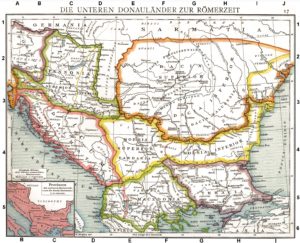
Illyricum and Thrace had grown to be important provinces in the empire even before the decline began. After the Batonnian Uprising from 6 – 9 AD, the Romans killed or resettled most of the native Illyrians and began to settle retired Legionnaires in their place in the Balkans. Important military cities began to flourish in places like Sirmium (modern day Sremska Mitrovica, Serbia), Naissus (modern day Niš, Serbia), and Serdica (modern day Sofia, Bulgaria). The military towns created a tradition, and it wasn’t long before the single largest group represented in the Roman Legions came from the Balkans.
And so when the Legions decided they needed to elect an emperor who was proven and trustworthy, there was a larger than average chance that emperor would be from the Balkans. Which is exactly what happened.
The First Balkan Roman Emperors
The first of the Illyrianici Emperors was Decius, who had been born in Simrium. He was elected in 249 AD after he killed the Emperor Philip the Arab, but only ruled two years – until 251. Nevertheless, he managed to enact a persecution against the Christians in that time period. And not just any persecution – the Decian Persecution managed to kill no less than the head of the Christian church himself – Pope Fabian. Decius died in during the Battle of Abritus in 251, a battle which proved to be an unmitigated disaster for the Roman Empire.
Decius was succeeded by his son, Hostilian, who only managed to rule from July to November of 251 before dying of either the plague or murder. It is also possible that he died of plague brought on by murder.
The next Balkan emperor was Claudius II “Gothicus”, who ruled for two short years from 268 to 270. Gothicus was born in either Sirmium or Naissus, the two largest military towns in the Empire. There are no good legends remaining about Gothicus – he was said to have nearly superhuman physical strength and to be tremendously cruel. One apocryphal story has him knocking out the teeth of a horse with one punch, although no one seems to have recorded why he would do such a thing. Gothicus, true to his name, fought the Goths. He died during the Plague of Cyprian, presumably because he could not punch the plague out of his own body.
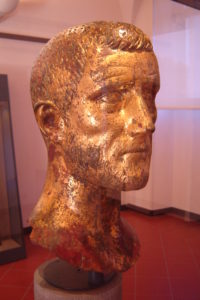
Gothicus’s brother, Quintillus, was elected by the Senate and managed to serve either 17 or 177 days until his assassination. Or suicide. No one is quite sure if he was killed or if he killed himself, but either way it was undeniably violent.
At this point the Crisis of the Third Century was fully underway, and something needed to be done. The fate of the empire would rest on the strength and capability of the man selected.
The Emperor Who Saved the Empire
Aurelian was born in either Serdica or Sirmium and was declared emperor by the Legions in 270 when the Legiones found Quintillus to be entirely unacceptable. Aurelian was just off his victorious campaign against the Goths, and it was decided he would be a much better choice – even if Quintillus had the support of the Senate.
It turned out that having the support of the army rather trumped the support of the Senate, and Aurelian defeated Quintillus on the field quite handily.
Aurelian’s troops did not know it at the time, but they managed to elect the man who would, in five short years, become known by the title “Restorer of the World”.
He managed to re-conquer Gaul, he restored public buildings, set fixed prices on most important goods so that ordinary people were able to better finance their necessities, and publicly prosecuted misconduct by public officers. These things all went very far in restoring trust in the Empire’s government. But the most effective action he took to regain the trust of the public was to cancel individual debts to the treasury, even making a bonfire of the records. The marketing optics were incomparable.
Aurelian was rumored to be the son of a woman who had been a priestess in the temple of the Sun God, Sol Invictus. This manifested in a raising up of the Sol Invictus cult and a Christian persecution.
In 275, the fifth year of his reign, Aurelian was headed on campaign against the Sassanids when he was murdered by his officers. Known to be a harsh disciplinarian, one of his secretaries sought to hide a mistake by circulating a fake list of those in the ranks who were marked for death as traitors. That fake list caused the officers to act together to save themselves, and Aurelian was swiftly killed.
It took nearly a year for the next emperor to be elected, and it is known that there was an interregnum between Aurelian’s death and the raising of Tacitus. During this time period an unusual coin striking was discovered – one that featured the Roman Empress Ulpia Severina, the wife of Aurelian. Very little is known about Ulpia, but it is entirely possible she was the only woman in the history of the Roman Empire to rule on her own, and in her own right.
She must have been magnificent. And as well – she was also born in the Balkans.
The Bad Side of a Good Emperor
The next Balkan emperor, Probus, was elected in 276. Having been born in Sirmium, which at this point may as well have been advertising itself as the birthplace of emperors and selling their waters as elixirs of power, he managed to rule for six years until he was assassinated.
In 284 another Roman Emperor from the Balkans arose, and this one would become world famous. Or, rather, he would become infamous. Diocletian, born in Solana (what is now Solin, Croatia) was from a low-status family. As with the other Illyrianici, he rose through the ranks of the military.
Unlike the earlier emperors, he voluntarily divided his empire into two, and then four. It seemed counter-intuitive to many, but the empire was so large and sprawling with so many different cultures that breaking it into smaller pieces with dedicated rulers for each area who were committed to ruling together in a complimentary manner helped bring many threatening issues under control. Thus the founding of The Tetrarchy was able to temporarily push back some of the looming problems that would unfold later. Part of what would make the emperors less powerful was their agreement to step down after a set number of years. Diocletian became the first Roman Emperor or Augustus to resign voluntarily in 305.
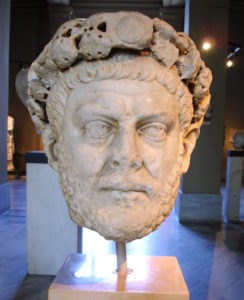
What he was famous for, though, was instituting the last and most violent persecution of Christians in the Empire.
Christianity had begun to spread quickly throughout the Roman Empire, and by 300 approximately 10% of the population was Christian. It was spreading beyond its largely urban beginnings into the countryside and beginning to attract more upper class adherents. Churches were becoming larger and more elaborate, closer to what we would now call Cathedrals.
The pagans in the empire recognized the growing monotheistic religion as a threat, and began to try to crack down.
In 299 the Early Persecution began. A divination was halted because the Haruspices (those who read the future in animal entrails) were unable to read and blamed the household Christians for the divination block. The entire villa and army would have to be cleansed.
In order to do so, all household members were required to perform sacrifices, with those who refused being severely punished. Particularly obstinate were the Manichaens, a sect of Gnostic Christians. As a result, the Manichaen leaders were ordered burned alive along with their scriptures. Later, lower status Manichaens were put to death by beheading.
In 302 this snowballed into the Great Persecution when Romanus of Caesaria, now a saint, was ordered to have his tongue cut out for interrupting pagan sacrifices. Romanus was later killed, but his behavior inspired Diocletian to sign the Edict Against Christians, which was published in 303. This edict was carried out to different extent in different parts of the empire, but it was particularly harsh in the Balkans.
This persecution against Christians became set in history as The Persecutions of Diocletian, and Diocletian himself became a figure in Serbian folklore as Dukjan, the enemy of God.
Diocletian chose retirement in 305, and forced his co-Augustus Maximum to retire with him. Maximium, born in Sirmium, had many difficulties staying retired. He agitated for the rule of his son after leaving power, eventually leading an unsuccessful revolt. In July 310 he hanged himself.
Diocletian died in 311, most likely a suicide as well.
The Most Famous (Balkan) Roman Emperors
The most famous Balkan Emperor of the Romans started out as a part of the Tetrarchy the year after Diocletian’s retirement. Constantine the Great was born in Naissus (modern day Niš, Serbia). His rule began in 305, and he would become the first Roman Emperor to convert to Christianity. He also tried to make some recompense for the Persecutions of Diocletian, restoring property to Christians who had been abused.
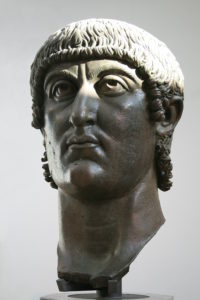
Other strides in Christianity occurred under Constantine the Great, such as the Edict of Milan, which declared tolerance for Christianity throughout the empire in 313 and the First Council of Nicea in 325, which resulted in the Nicene Creed still said throughout Christian churches today.
Constantine I was not all Christian-goodness and sing-alongs, though. He had his own son, Crispus put to death in 326 and followed it up by boiling his wife Fausta in her bath just a few months later. He then purged them from the historical record. The unsupported reason for these two killings was that the two were having an affair. This has not be supported by any evidence, however.
Constantine the Great died after a protracted illness in 337. He was followed by his son with Fausta, the wife he murdered.
In 337, Constantius II, born in Sirmium, became the Emperor of Rome.
Constantius was a practitioner of Arian Christianity, which he promoted while persecuting pagans and Jews in the empire. He also presided over a fracturing empire, with different emperors and factions rising up and needing to be dealt with. It was under Constantius II that Rome’s bloodiest battle, the Battle of Mursa Major, would take place as he worked to put down the usurper Magnentius.
With war overshadowing his entire reign, Constantius II died of illness while on campaign in 361.
Although there would be nine more Balkan Emperors of Rome, only one would remain a household name through the intervening centuries: The Emperor Justinian.
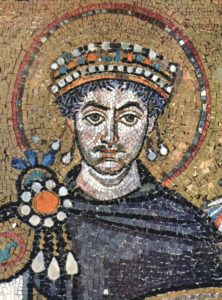
Justinian, called “The Last Roman” by some modern scholars, was not born to a royal family. His uncle Justin I had been born a peasant, and in some sources was described as a swineherd. From near what is now Skopje, Macedonia, Justinian was not only the last Roman – he was the last emperor from the Balkans. After this point most of the Balkans would shift inexorably toward the Eastern Empire ensconced in Constantinople.
Justinian ruled from the death of his uncle in 527 to his death of old age in 565, but before his death he would completely rework the legal code into the basis of the law that is still used in many countries today. He also provided an excuse and template for lovestruck royals throughout the centuries who fought against a system requiring spouses of a certain bloodline – Justinian, the up-jumped Macedonian peasant – married a former prostitute.
The fact that the Balkans ruled the Roman Empire for more than two centuries is often overlooked and not given nearly enough attention in the historical record. It was perhaps inevitable that the Crossroads of Europe would become the leaders of Europe, but it would be short-lived. The Balkans, attacked by invaders from the East, would quickly depopulate. The Christianity that had taken root there before anywhere else in the world would be nearly wiped out, with churches emptying of worshippers and falling into ruin.
Into these nearly empty lands would come a new people – pagan, rural, and illiterate. The Slavs were able to repopulate and take-over the Balkans within 100 years, and their influence has dominated the region ever since; unique in religion, language, and culture.
One living remnant of Roman Balkan rule still exists today: the Vlach people, nomadic Latin speakers, still live in areas of Serbia, Albania, Romania, and Greece today.
- July 1, 2020
- Bosnia and Herzegovina , Bulgaria , Croatia , Serbia
